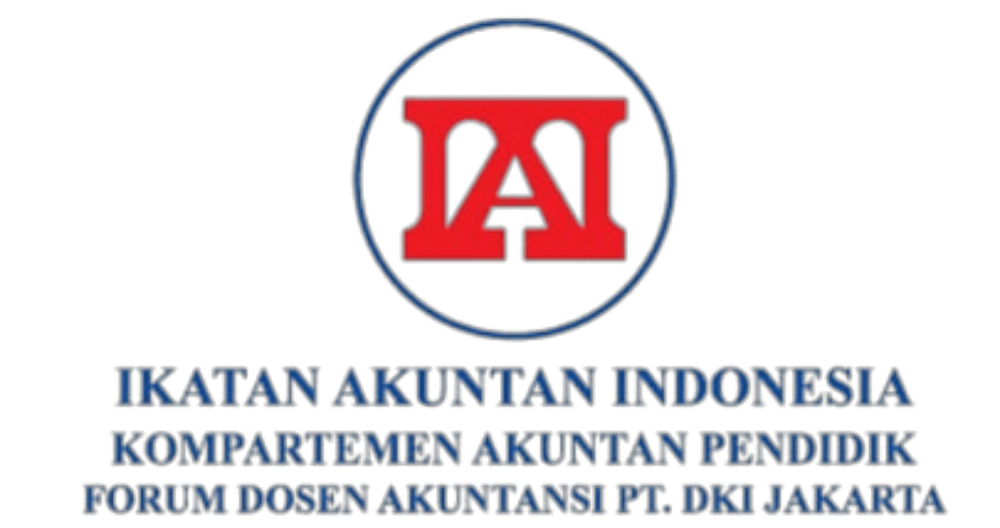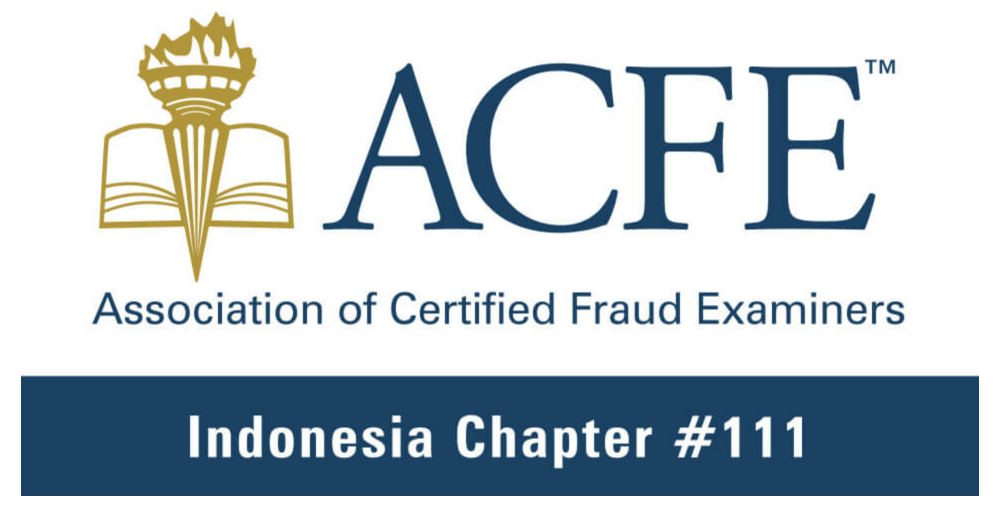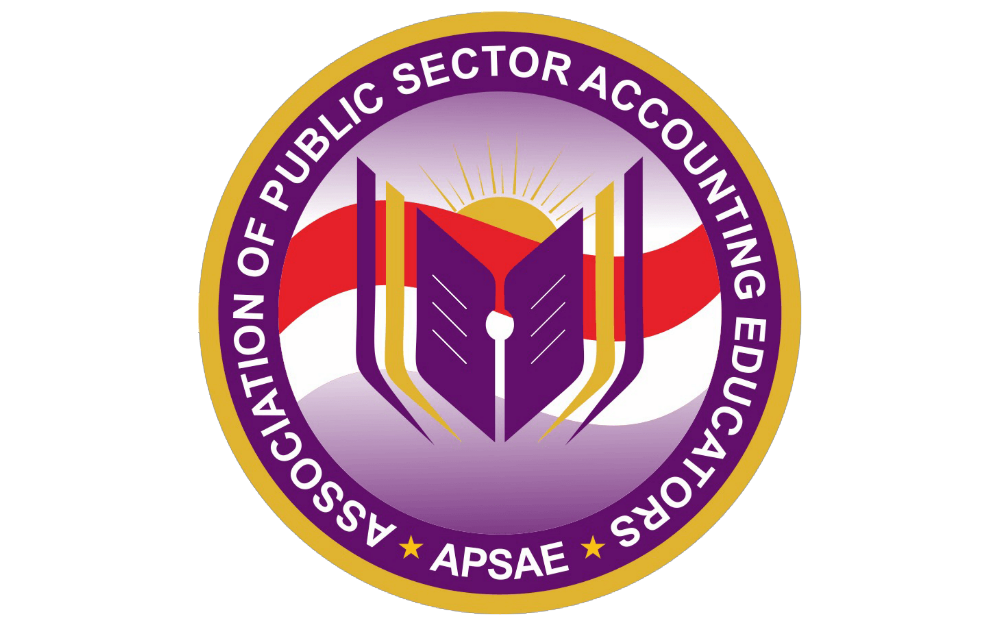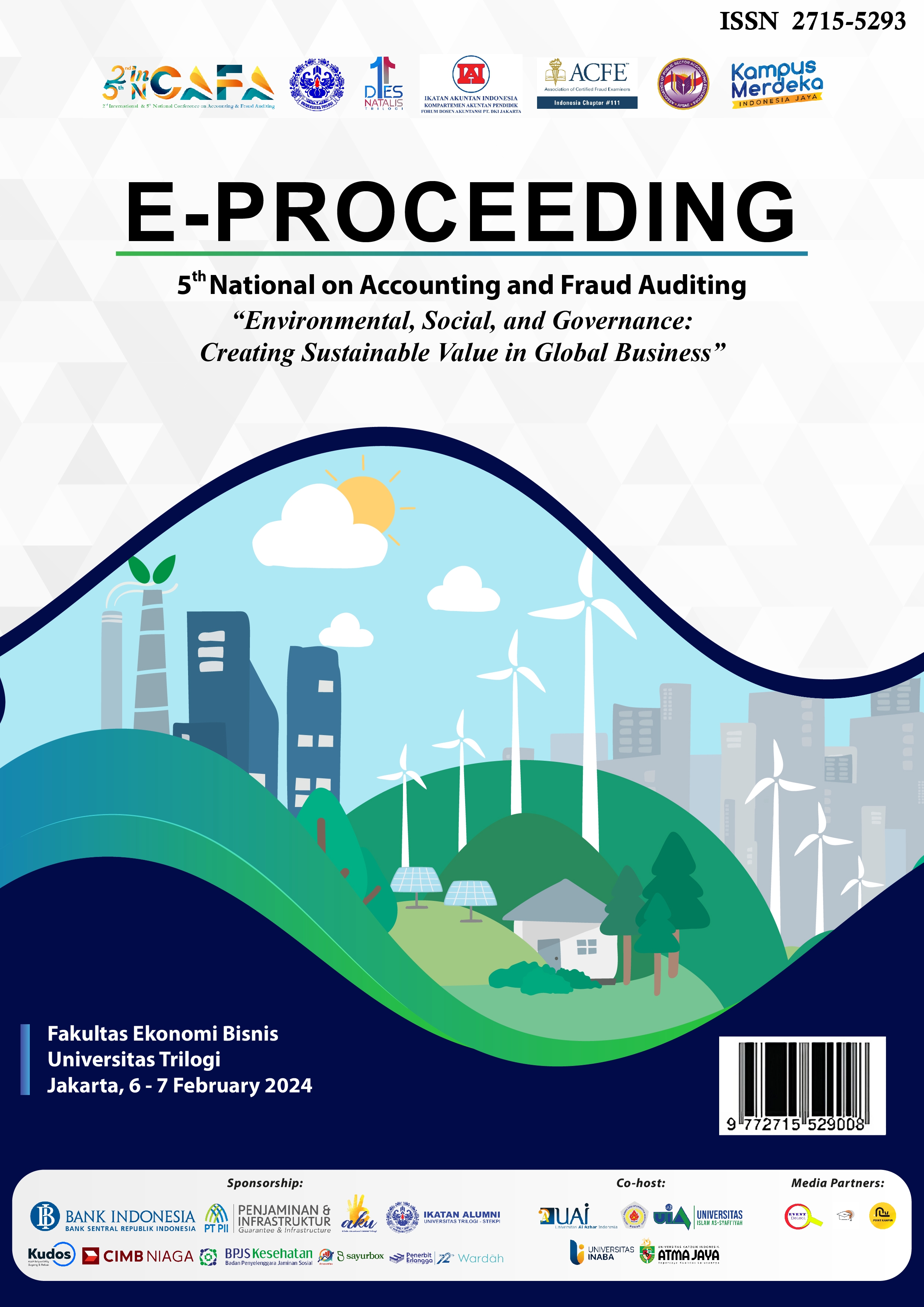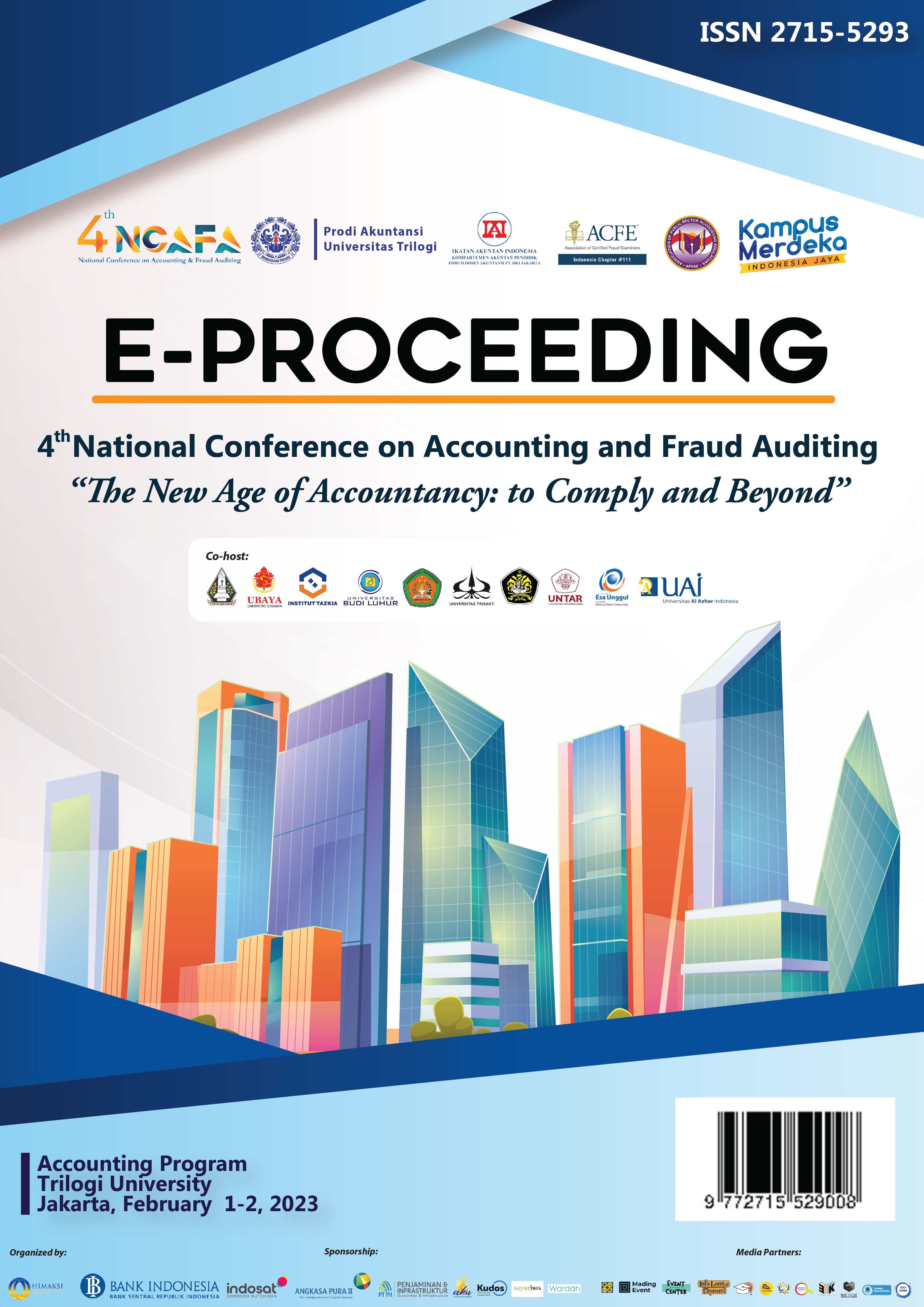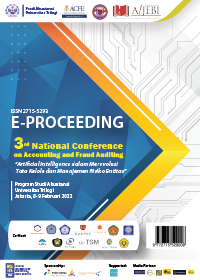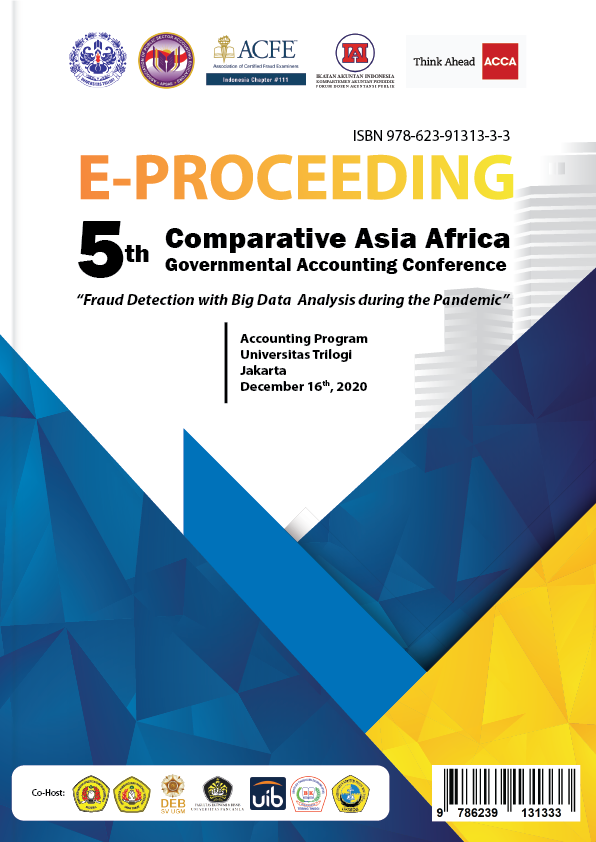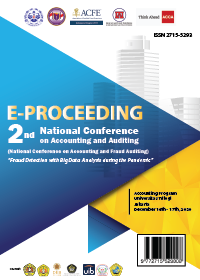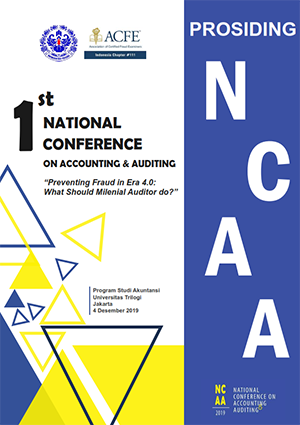Implementation of Government Accounting Standards During Pandemic and Internal Auditor Support in Preventing Fraud.
Abstract
This paper aims to discuss the implementation of government accounting during the pandemic in Indonesia and the role of the Government's Internal Supervisory Apparatus in realizing accountability for the professional, credible, transparent and accountable State Revenue and Expenditure Budget for the 2020 Fiscal Year.
All government internal supervisors, both at the central and regional levels, are required to continue to maintain the implementation of handling Covid-19 and continue to collaborate, innovate, and help each other to create accountability for handling Covid-19 in their respective regions. Therefore, the government must continue to cooperate with the Financial and Development Supervisory Agency as internal auditors, as well as all internal supervisory officials in ministries / agencies and local governments. Handling the covid-19 pandemic requires speed but at the same time it is emphasized that speed must not neglect accountability, transparency and good management. This paper also describes public sector accounting reforms. Reform of the government accounting system in Indonesia began with the issuance of Law Number 17 of 2003 concerning State Finance. The law mandates that the government accounting system in Indonesia, which was previously cash-based, must change to an accrual basis. In its implementation, several obstacles arise, ranging from changes in the mindset of actors in the public sector, limited human resources to the political will of each regional head. This study uses a qualitative approach with descriptive type of research. The data collection technique uses literature study, namely through a review of various literature studies and regulations related to the research topic. Data can be obtained from books or literature such as articles, online media, research results that have relevance to the title of the article.
The implication of this study is that the implementation of government accounting during a pandemic must still meet accountability, transparency and good governance according to applicable standards. The Government Accounting Standards Committee has issued guidelines for implementing relevant Government Accounting Standard Statements related to government programs and activities carried out in the context of handling the Covid-19 Pandemic.
Keywords: public : public sector, accounting reform, internal auditors, fraud.
Full Text:
PDFReferences
Arjuli, D. (2019). Jurnal Humaniora Pengaruh Kebijakan Pertanggungjawaban Akuntansi Sektor. Jurnal Humaniora, Vol. 3, No. 1, April 2019 : 26-35, 3(1), 26–35.
Asy ’, M. A., Prasetyono, A., & Haryadi, B. (2013). Peran Dan Fungsi Satuan Pengawasan Intern Dalam Pencegahan Fraud Pada Perguruan Tinggi X. JAFFA Oktober, 01(2), 99–112.
Prof. Indra Bastian, P. D. (2019). Lingkup Akuntansi Sektor Publik. Lingkup Akuntansi Sektor Publik, 1–52.
Risnaningsih. (2016). IMPLEMENTASI DAN KENDALA SISTEMAKUNTANSI PEMERINTAH DAERAH BERBASIS AKRUAL Writer: Universitas Tribhuwana TunggadewiMalang, XI(2). http://ejournal.stiedewantara.ac.id/
Rizky, H. P., & Setiawan, D. (2019). Perkembangan Penelitian Akuntansi Sektor Publik di Indonesia. Assets: Jurnal Akuntansi Dan Pendidikan, 8(2), 94. https://doi.org/10.25273/jap.v8i2.4647
Santoso, U., & Pambelum, Y. J. (2008). Pengaruh Penerapan Akuntansi Sektor Publik Terhadap Akuntabilitas Kinerja Instansi Pemerintah Dalam Mencegah Fraud. Jurnal Administrasi Bisnis Unpar, 4(1), 14–33. https://doi.org/10.26593/jab.v4i1.363.
Simanjuntak, B. H. (2005). Menyongsong Era Baru Akuntansi Pemerintahan Di Indonesia. Jurnal Akuntansi Pemerintah, 1–15.
Standar, K., & Pemerintahan, A. (2020). PANDUAN PENERAPAN STANDAR AKUNTANSI PEMERINTAHAN ( SAP ) PADA MASA PANDEMI COVID-19.
Suryanto, S. (2018). Prodi ilmu pemerintahan fisip unikom. 6.
Tedi Rustendi. (2018). Fraud Pencegahan Dan Pengungkapannya Dalam Perspektif Audit Internal (Issue Januari). https://www.researchgate.net/publication/336114251%0AFRAUD:
Yuhertiana, & Indrawati. (n.d.). REFORMASI AKUNTANSI SEKTOR PUBLIK: MEWUJUDKAN PELAYANAN PUBLIK YANG LEBIH BAIK MELALUI PELAPORAN KEUANGAN PEMERINTAHAN YANG AKUNTABEL Indrawati Yuhertiana. 1–17.
Bastian, Indra. 2010. Akuntansi Sektor Publik: Suatu Pengantar. Erlangga, Jakarta
Zahari, A.I., Said, J. and Arshad, R. (2020), "Organisational fraud: a discussion on the theoretical perspectives and dimensions", Journal of Financial Crime, Vol. 27 No. 1, pp. 283-93. https://doi.org/10.1108/JFC-04-2019-0040
Tarigan dan Nurtanzila.(2013),"Standar Akuntansi Pemerintahan dalam Mewujudkan Akuntabilitas dan Transparansi Pengelolaan Keuangan Daerah",Jurnal Kebijakan & Administrasi Publik JKAP Vol 17 No 1 - Mei 2013 ISSN 0852-9213
Yayasan pendidikan Internal Audit. (2008). Pengendalian Internal & ManajemenRisiko. Jakarta : YPIA.
https://www.kemenkeu.go.id/publikasi/siaran-pers/siaran-pers-rakernas-akuntansi-dan-pelaporan-keuangan-pemerintah-2020-mewujudkan-akuntabilitas-dalam-penanganan-pandemi-covid-19-dan-pemulihan-ekonomi-nasional, 22 September 2020.
https://setkab.go.id/peran-internal-audit-dalam-pengawasan-pelaksanaan-kebijakan-di-masa-status-kejadian-luar-biasa/
https://www.tempo.co/abc/5446/pemerintah-indonesia-diminta-terbuka-dan-tegas-dalam-tangani-virus-corona
https://www.ayosemarang.com/read/2020/04/25/55953/mengatasi-bencana-covid-19-tanpa-takut-terkena-becana-korupsi, 25 April 2020 Penulis Adib Auliawan Herlambang.
DOI: https://doi.org/10.31326/.v2i2.780
Refbacks
- There are currently no refbacks.

